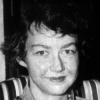Flannery O'Connor

Flannery O'Connor
Mary Flannery O'Connorwas an American writer and essayist. An important voice in American literature, she wrote two novels and 32 short stories, as well as a number of reviews and commentaries. She was a Southern writer who often wrote in a Southern Gothic style and relied heavily on regional settings and grotesque characters. Her writing also reflected her own Roman Catholic faith and frequently examined questions of morality and ethics. Her posthumously-compiled Complete Stories won the 1972 U.S. National Book...
NationalityAmerican
ProfessionNovelist
Date of Birth25 March 1925
CitySavannah, GA
CountryUnited States of America
There is something in us, as storytellers and as listeners to stories, that demands the redemptive act, that demands that what falls at least be offered the chance to be restored.
When the peacock has presented his back, the spectator will usually begin to walk around him to get a front view; but the peacock will continue to turn so that no front view is possible. The thing to do then is to stand still and wait until it pleases him to turn. When it suits him, the peacock will face you. Then you will see in a green-bronze arch around him a galaxy of gazing, haloed suns.
Knowing who you are is good for one generation only. You haven't the foggiest idea where you stand now or who you are
If it's just a symbol, then to hell with it !
Many of my ardent admirers would be roundly shocked and disturbed if they realized that everything I believe is thoroughly moral, thoroughly Catholic, and that it is these beliefs that give my work its chief characteristics.
Nothing needs to happen to a writer’s life after they are 20. By then they’ve experienced more than enough to last their creative life.
The Catholic writer, in so far as he has the mind of the Church, will feel life from the standpoint of the central Christian mystery; that it has, for all its horror, been found by God to be worth dying for.
Faith has to take in all the other possibilities it can.
But learned people can analyze for me why I fear hell and their implication is that there is no hell. But I believe in hell. Hell seems a great deal more feasible to my weak mind than heaven. No doubt because hell is a more earth-seeming thing. I can fancy the tortures of the damned but I cannot imagine the disembodied souls hanging in a crystal for all eternity praising God.
I am a writer because writing is the thing I do best.
I have found, in short, from reading my own writing, that my subject in fiction is the action of grace in territory largely held by the devil.
I am tired of reading reviews that call A Good Man brutal and sarcastic. The stories are hard but they are hard because there is nothing harder or less sentimental than Christian realism.... when I see these stories described as horror stories I am always amused because the reviewer always has hold of the wrong horror.
When you can state the theme of a story, when you can separate it from the story itself, then you can be sure the story is not a very good one.
Woman! Do you ever look inside? Do you ever look inside and see what you are not? God!